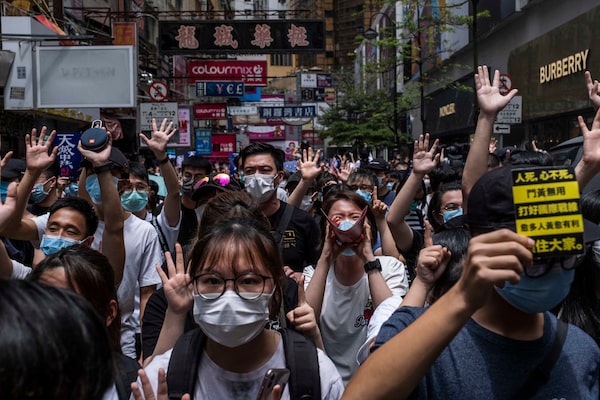
Protesters gather against new security laws in Hong Kong, May 24, 2020. Thousands of protesters swarmed some of Hong Kong's busiest neighborhoods on Sunday, singing, chanting and erecting roadblocks of torn-up bricks and debris, as the police repeatedly fired tear gas, pepper spray and a water cannon during the city's largest street mobilization in months.LAM YIK FEI/The New York Times News Service
The Communist Party of China just won’t quit.
Having suffered a setback last year in its attempt to impose an extradition law on Hong Kong, China’s ruling party has cooked up a new recipe for putting the semi-autonomous territory under the thumb of its national security state.
The summer of protests prompted by the extradition legislation, which would have allowed China to arrest pro-democracy Hong Kongers and transfer them to the mainland, appears to have convinced Beijing that it can no longer honour the “one country, two systems” principle it agreed to in 1997.
As well, the international criticism that met last year’s attempt to compel obedience from Hong Kong residents – who are simply insisting on their constitutional right to live under the liberties and rule of law they have long known – has not dissuaded Beijing from trying again.
On Friday, China announced plans for new national security legislation that will allow it to crack down on dissent in Hong Kong, under the guise of fighting terrorism and subversion, and to install its security forces in the territory itself.
China claims that this is about protecting the people of Hong Kong from overseas threats, such as the imaginary foreign agents the Communist Party portrays as behind last summer’s pro-democracy, anti-Beijing protests. The real reason is that Beijing is consistently embarrassed by the territory’s freedoms, most recently by reports in Hong Kong media about its attempts to cover up the novel coronavirus outbreak in Wuhan.
If China is allowed to reach into Hong Kong like this, it will spell the end of “one country, two systems."
How is it even possible for Beijing to pretend, as it is doing in the hallucinatory manner in which it so often sells its version of the truth, that these new measures are about preserving “one country, two systems”?
On the contrary, the open presence of mainland security forces in Hong Kong would be a complete evisceration of the principle, and the territory’s autonomy.
What China promised in 1997 was not “one country, two systems, plus Beijing’s henchmen on every corner.” What was agreed, instead, was that Hong Kong would be allowed to maintain its rule of law, enjoy rights of speech and assembly, and make its own decisions about its future. It was even given a semi-democratic system of government, with a promise to allow an evolution to full democracy.
What Beijing is proposing threatens to end the territory’s basic freedoms. Would you go to a protest if you had to walk past the front door of the local office of China’s Ministry of State Security on your way home?
As well, the manner of its introduction erases the territory’s right to self government. China’s resolution gives Hong Kong’s government two choices: put Beijing’s new measures into place, or pass a local version of the law that matches what the party is calling for.
Some choice.
The Chinese Communist Party is not fooling anyone. Its intention is plain: to fatally erode “one country, two systems." That has long been a goal of China’s leader, Xi Jinping.
It’s true that, since 1997, Beijing has had reliable means to exert control over Hong Kong’s government: the executive and the legislative council, of which half the representatives are elected and the rest are appointed through a China-friendly process.
But it yearns for more, and is troubled by the democratic forces’ landslide victory in local council elections last fall. The results revealed the depth of Hong Kong’s opposition to China. In this fall’s legislative council elections, pro-democracy forces aim to go further and do what was previously thought impossible: Win a majority.
For the Xi regime, loss of control is a terrifying prospect. Beijing wants Hong Kong to be as compliant as any city on the mainland – a compliance enforced through force and fear.
Canada, the United Kingdom and Australia have all decried Beijing’s move. The United States has also protested, and it has in its arsenal a law that would allow it to end Hong Kong’s much-coveted special trading status if its autonomy is compromised.
Once again, Beijing is forcing the democratic world to rise up in defence of Hong Kong, and to demand that China keep its word. It’s not too late to fight back. As last year showed.
Our Morning Update and Evening Update newsletters are written by Globe editors, giving you a concise summary of the day’s most important headlines. Sign up today.